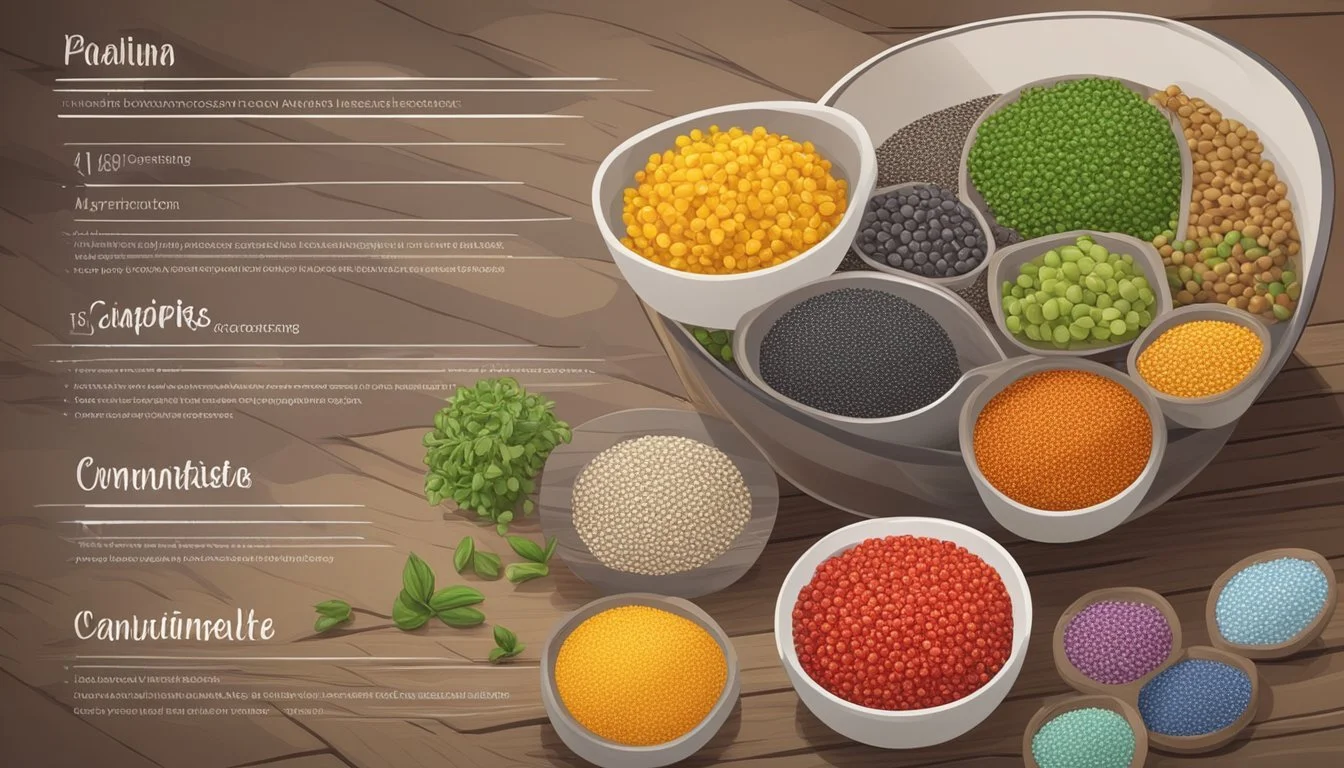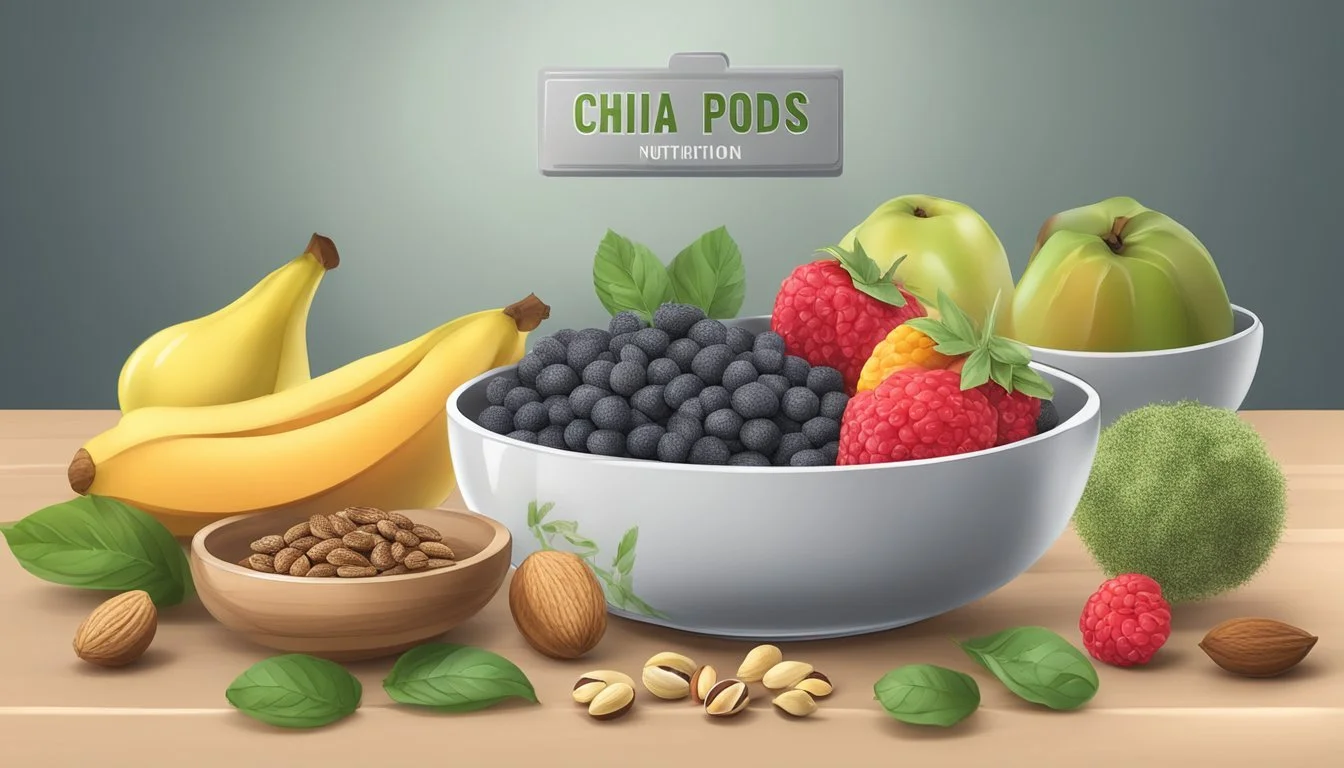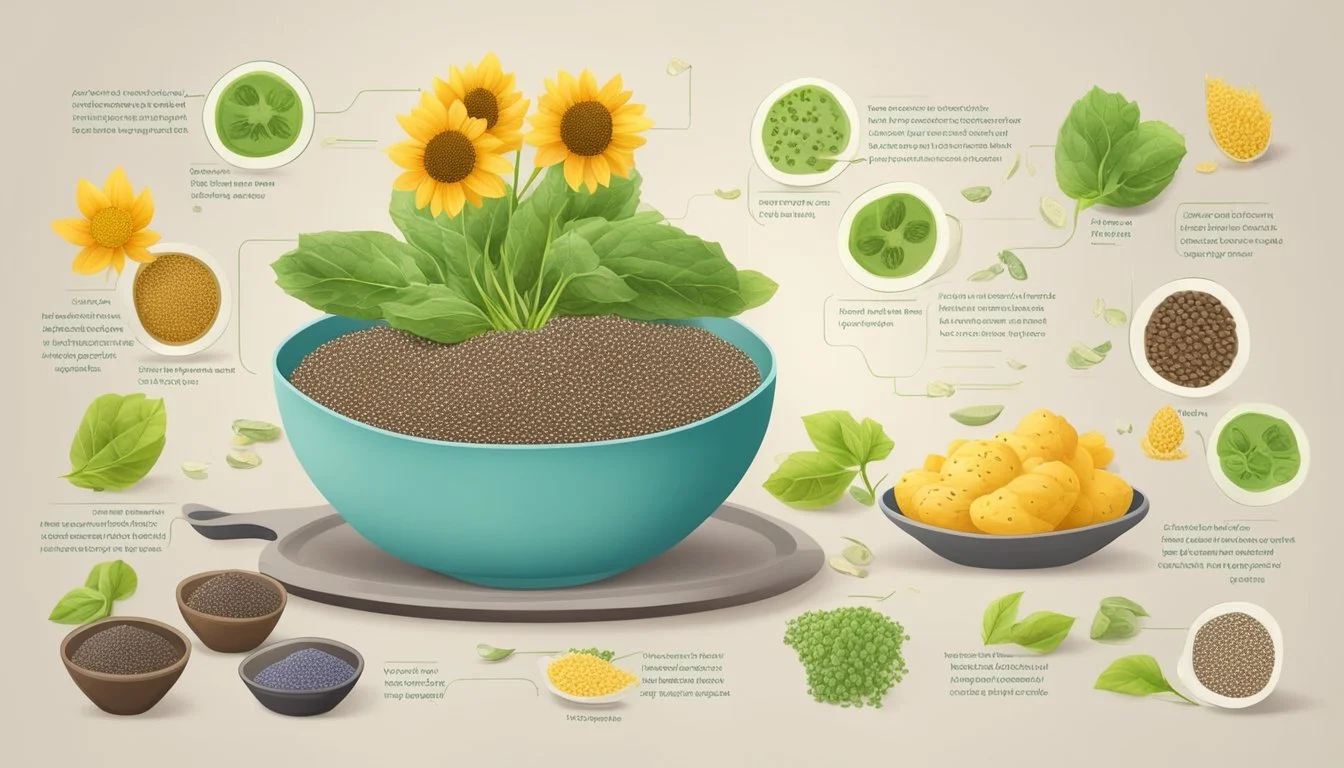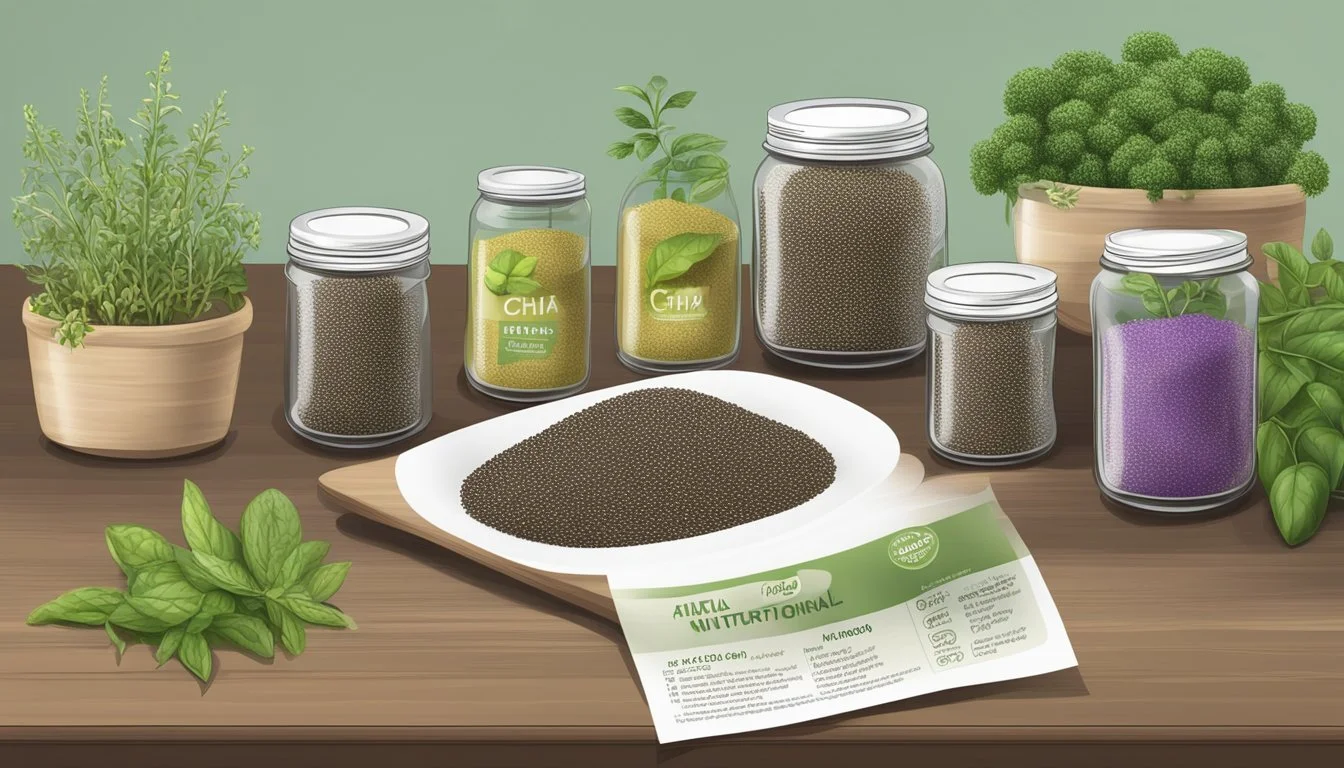Chia Pods Nutrition Facts & More
Unveiling the Superfood's Health Benefits
Chia pods have emerged as a popular nutritious snack, packed with the goodness of chia seeds (Salvia hispanica). These tiny seeds offer a wealth of nutrients in a convenient, ready-to-eat form. A single serving of chia pods typically contains around 138 calories, with 46% carbohydrates, 34% fat, and 19% protein.
Chia seeds are versatile ingredients that can be incorporated into various recipes. They are rich in omega-3 fatty acids, fiber, protein, antioxidants, and essential minerals like calcium, magnesium, and phosphorus. This nutrient profile makes chia pods a nutritious choice for those seeking a balanced snack or meal replacement.
The versatility of chia pods allows for creative recipe variations. They can be customized with different flavors, fruits, and toppings to suit individual preferences while maintaining their nutritional benefits. This adaptability makes chia pods an appealing option for health-conscious consumers looking for convenient, nutrient-dense foods.
What Are Chia Pods?
Chia pods are convenient, pre-packaged snacks or breakfast options that combine chia seeds with liquid to create a pudding-like texture. These nutrient-dense foods have gained popularity due to their health benefits and ease of consumption.
Defining Chia Pods
Chia pods consist of chia seeds soaked in liquid, typically milk or plant-based alternatives. The seeds absorb the liquid, forming a gel-like consistency. This mixture is often flavored with fruits, nuts, or sweeteners. Chia pods are usually sold in single-serving containers, making them a grab-and-go option for busy individuals.
The main ingredient, chia seeds, are tiny black or white seeds packed with nutrients. They contain fiber, protein, omega-3 fatty acids, and various vitamins and minerals. When hydrated, chia seeds expand, creating a satisfying and filling snack.
Historical Background
Chia seeds have a rich history dating back to ancient civilizations. The Aztecs and Mayans cultivated and consumed chia seeds as a staple food. These Mesoamerican cultures valued chia for its nutritional properties and believed it provided strength and endurance.
In Aztec and Mayan societies, chia seeds were used in religious ceremonies and as currency. Warriors consumed chia seeds during long marches and battles for sustained energy. The seeds' ability to absorb water made them ideal for long-distance travel.
Modern chia pods represent a contemporary adaptation of this ancient superfood. They offer a convenient way to incorporate the nutritional benefits of chia seeds into today's fast-paced lifestyles.
Nutritional Profile
Chia seeds pack a powerful nutritional punch, offering a diverse array of essential nutrients in a small package. These tiny seeds are renowned for their exceptional nutrient density and potential health benefits.
Macronutrient Breakdown
Chia seeds contain an impressive balance of macronutrients. A 28-gram (1-ounce) serving provides:
Calories: 138
Protein: 4.7 grams
Fat: 8.7 grams
Carbohydrates: 12 grams
Fiber: 9.8 grams
The high fiber content stands out, contributing to their satiating effect. Chia seeds are also rich in omega-3 fatty acids, particularly alpha-linolenic acid (ALA). This plant-based omega-3 makes up about 60% of the total fat content.
Protein in chia seeds is complete, containing all nine essential amino acids. This makes them an excellent protein source for vegetarians and vegans.
Vitamins and Minerals Content
Chia seeds are packed with essential vitamins and minerals. Key micronutrients include:
Calcium: 179 mg (18% of Daily Value)
Phosphorus: 265 mg (27% of DV)
Magnesium: 95 mg (23% of DV)
Iron: 2.2 mg (12% of DV)
Zinc: 1.3 mg (12% of DV)
These seeds are particularly high in calcium, providing more per gram than most dairy products. They also contain trace amounts of potassium, vitamin A, and folate.
Chia seeds' mineral content supports bone health, energy metabolism, and immune function. Their nutrient profile makes them a valuable addition to various diets.
Antioxidant Properties
Chia seeds are rich in antioxidants, which help protect the body from oxidative stress and cellular damage. Key antioxidants include:
Quercetin
Kaempferol
Chlorogenic acid
Caffeic acid
These compounds contribute to the seeds' health-promoting properties. Antioxidants in chia seeds may help reduce inflammation and support overall health.
The antioxidant content also helps preserve the seeds' high omega-3 fatty acid content, preventing rancidity and extending shelf life. This makes chia seeds a stable and long-lasting source of these essential nutrients.
Health Benefits
Chia seeds offer a range of health benefits due to their nutrient-rich profile. These tiny seeds pack a powerful punch, contributing to various aspects of wellness.
Digestive and Gut Health
Chia seeds are an excellent source of dietary fiber, providing 10 grams in just 2 tablespoons. This high fiber content supports digestive health by promoting regular bowel movements and feeding beneficial gut bacteria.
The soluble fiber in chia seeds forms a gel-like substance when mixed with liquid, which can help slow digestion and promote feelings of fullness. This gel also acts as a prebiotic, nourishing the good bacteria in the gut.
Studies suggest that a healthy gut microbiome may boost immune function and reduce inflammation. By incorporating chia seeds into one's diet, individuals may support their overall digestive health and gut function.
Heart Health and Blood Pressure
Chia seeds are rich in omega-3 fatty acids, particularly alpha-linolenic acid (ALA). These healthy fats play a crucial role in supporting cardiovascular health.
Research indicates that consuming ALA may help reduce the risk of heart disease by lowering inflammation and improving cholesterol levels. Chia seeds also contain fiber and antioxidants, which further contribute to heart health.
Some studies suggest that regular chia seed consumption may help lower blood pressure. This effect is likely due to the combination of omega-3s, fiber, and minerals like potassium and magnesium found in chia seeds.
Bone Health and Anti-Inflammatory Effects
Chia seeds are a good plant-based source of calcium, phosphorus, and magnesium - essential minerals for maintaining strong bones. A single ounce of chia seeds provides about 18% of the daily recommended intake of calcium.
These seeds also contain boron, a trace mineral that helps the body metabolize calcium, magnesium, and phosphorus. This combination of nutrients may contribute to improved bone density and strength.
The omega-3 fatty acids and antioxidants in chia seeds have anti-inflammatory properties. Chronic inflammation is linked to various health issues, including arthritis and heart disease. By incorporating chia seeds into one's diet, individuals may help reduce inflammation in the body.
Diabetes and Blood Sugar Management
Chia seeds may play a role in blood sugar management, making them potentially beneficial for individuals with diabetes or those at risk of developing the condition.
The high fiber content of chia seeds can slow the absorption of sugar in the bloodstream, helping to prevent rapid spikes in blood glucose levels. This effect may be particularly beneficial for people with type 2 diabetes.
Some studies have shown that adding chia seeds to meals can reduce post-meal blood sugar levels. The protein content in chia seeds may also contribute to better blood sugar control by slowing digestion and reducing appetite.
Weight Management and Satiety
Chia seeds may support weight management efforts due to their high fiber and protein content. These nutrients can help promote feelings of fullness and reduce overall calorie intake.
When mixed with liquid, chia seeds expand and form a gel. This gel can help slow digestion and prolong feelings of satiety, potentially reducing snacking between meals.
The protein in chia seeds may also help support lean muscle mass, which is important for maintaining a healthy metabolism. While chia seeds alone are not a magic solution for weight loss, they can be a valuable addition to a balanced diet and healthy lifestyle.
Usage in Diet
Chia pods offer versatile options for incorporating nutrient-dense seeds into daily meals. Their mild flavor and adaptable texture make them suitable for various culinary applications.
Introducing Chia Pods to Meals
Chia pods can be easily added to breakfast, lunch, and dinner dishes. Sprinkle them over yogurt or cereal for a crunchy texture and fiber boost. Blend chia pods into smoothies for added thickness and nutrition. Mix them into salad dressings or sprinkle directly on salads for extra protein and omega-3 fatty acids.
For baked goods, incorporate chia pods into muffin, bread, or cookie recipes. They can replace eggs in vegan baking due to their gel-forming properties when mixed with liquid.
Ideal Pairings and Combinations
Chia pods pair well with fruits, nuts, and seeds. Add them to oatmeal with berries and almonds for a nutritious breakfast. Combine chia pods with Greek yogurt and honey for a protein-rich snack.
Mix chia pods into homemade granola or trail mix for on-the-go energy. They also complement savory dishes like stir-fries or grain bowls, adding texture and nutrients without overpowering flavors.
Chia Pods in Special Diets
Chia pods are valuable in plant-based diets, providing complete protein with all nine essential amino acids. Their high fiber content supports digestive health and promotes satiety, beneficial for weight management plans.
For gluten-free diets, chia pods offer a safe, nutrient-dense option. They can be used to create gluten-free puddings or as a binder in gluten-free baking.
In low-carb or ketogenic diets, chia pods provide healthy fats and fiber with minimal net carbs. They can be used to create low-carb puddings or added to keto-friendly smoothies for extra nutrients.
Potential Health Considerations
Chia seeds offer many nutritional benefits, but some people may experience adverse effects. Awareness of potential allergies, interactions, and digestive responses is important when incorporating chia seeds into one's diet.
Allergies and Interactions
Chia seed allergies are rare but can occur. Symptoms may include skin rashes, hives, or difficulty breathing. People with allergies to other seeds or nuts should exercise caution.
Chia seeds can interact with certain medications. They may enhance the effects of blood thinners due to their omega-3 content. This could potentially increase bleeding risk.
Those taking blood pressure medications should monitor their levels closely. Chia seeds may lower blood pressure, potentially amplifying medication effects.
Individuals with hormone-sensitive cancers should consult a doctor before consuming chia seeds. The seeds contain alpha-linolenic acid, which can mimic estrogen in the body.
Digestive Response and Bloating
Chia seeds are high in fiber, containing both soluble and insoluble types. This can lead to digestive issues for some people, especially when consumed in large amounts.
Bloating is a common side effect when first adding chia seeds to the diet. The seeds absorb water and expand in the digestive tract, which may cause discomfort.
To minimize bloating, start with small amounts of chia seeds and gradually increase intake. Drink plenty of water when consuming chia seeds to aid digestion.
Some people may experience constipation or diarrhea when eating chia seeds. Balancing fiber intake from various sources can help maintain digestive health.
Chia seeds contain omega-6 fatty acids, which in excess can contribute to inflammation. Maintaining a proper balance of omega-3 to omega-6 fatty acids is crucial for overall health.
Nutritional Comparison
Chia seeds offer an impressive nutritional profile, packed with fiber, omega-3 fatty acids, and essential minerals. Their nutritional density makes them stand out among other seeds and plant-based superfoods.
Chia Seeds vs. Other Seeds and Nuts
Chia seeds contain more fiber than most other seeds and nuts. A 1-ounce (28g) serving provides 10 grams of fiber, surpassing flax seeds, which offer 8 grams per ounce.
Omega-3 content is another area where chia seeds excel. They are rich in alpha-linolenic acid (ALA), an essential omega-3 fatty acid. Chia seeds contain more ALA than flax seeds per serving.
Protein content in chia seeds is comparable to many nuts. They provide about 4 grams of protein per ounce, similar to almonds.
Chia seeds outperform sesame seeds in calcium content, offering 18% of the daily value per ounce compared to sesame seeds' 3%.
Chia Pods and Other Superfoods
Chia pods, which combine chia seeds with liquid, enhance nutrient absorption. The gel-like consistency of hydrated chia seeds may slow digestion, promoting a feeling of fullness.
Compared to other superfoods like acai berries or goji berries, chia pods offer more fiber and omega-3s. However, berries typically provide more antioxidants.
Chia pods have a lower sugar content than many fruit-based superfood products. This makes them a suitable option for those monitoring their sugar intake.
While chia seeds don't contain EPA (a type of omega-3 found in fish), their high ALA content can be partially converted to EPA in the body.
Culinary Uses and Recipes
Chia seeds offer versatility in the kitchen, transforming dishes with their unique texture and nutritional benefits. From creamy puddings to crunchy toppings, these tiny powerhouses enhance both sweet and savory recipes.
Making Chia Pods at Home
Chia pods are simple to prepare and customizable. Mix 3 tablespoons of chia seeds with 1 cup of liquid (milk, plant-based milk, or juice). Stir well and refrigerate for at least 2 hours or overnight. The seeds absorb the liquid, forming a gel-like substance.
Add sweeteners like honey or maple syrup to taste. Top with fresh berries, sliced banana, or coconut flakes for extra flavor and texture. For a chocolatey twist, blend in cocoa powder before chilling.
Chia pods make excellent breakfast options or healthy snacks. They're rich in fiber, protein, and omega-3 fatty acids.
Innovative Recipe Ideas
Chia seeds can elevate various dishes beyond traditional puddings. Use them as an egg substitute in baking by mixing 1 tablespoon of chia seeds with 3 tablespoons of water for each egg needed.
Sprinkle raw chia seeds on yogurt, oatmeal, or salads for a nutritional boost and subtle crunch. Incorporate them into smoothies for added thickness and nutrition.
Try chia-crusted fish or chicken for a unique texture. Add chia to homemade energy bars or granola for sustained energy. Blend chia into pancake or muffin batter for extra fiber and omega-3s.
Purchasing and Storage
Chia pods offer a convenient and nutritious snack option. Proper purchasing and storage practices ensure you get the most value and freshness from these products.
Where to Buy Chia Pods
Chia pods are widely available in many grocery stores and health food shops. Look for them in the refrigerated section near yogurt or prepared foods. Major supermarket chains often stock popular brands like The Chia Co.
Online retailers provide another convenient option for purchasing chia pods. Amazon, Thrive Market, and specialty health food websites frequently offer a variety of flavors and brands.
Some natural food co-ops and local health stores may carry chia pods from smaller, artisanal producers. These can be a great way to try unique flavor combinations or support local businesses.
Best Practices for Storage
Chia pods require refrigeration to maintain freshness and prevent spoilage. Store them at 40°F (4°C) or below in your refrigerator.
Check the "best by" date on the packaging before purchasing. Choose pods with the furthest date to ensure maximum freshness.
Once opened, consume chia pods within 24 hours for optimal taste and texture. Unopened pods typically last 1-2 weeks when properly refrigerated.
Avoid freezing chia pods, as this can alter their texture and consistency. The high water content in chia seeds may cause expansion and damage to the product.
Always inspect chia pods before consuming. Look for signs of spoilage such as off-odors, mold, or unusual discoloration. If in doubt, it's best to discard the product.








